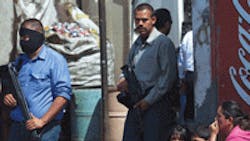Drug cartels responsible for as many as 22,000 reported deaths in Mexico over the past three years have put manufacturing plants along the border on notice but have not impeded business activity, say economic-development and plant officials.
The violence has not affected any U.S. citizens visiting the plants, known as maquiladoras, and is primarily targeted at individuals involved in the drug trade, says K. Alan Russell, whose El Paso, Texas, company The Tecma Group operates maquilas throughout Mexico.
"It is certainly a very dangerous environment if you're in the wrong business, but the data tells us we're not the ones being targeted," says Russell, Tecma's co-founder and president. "There's certainly the possibility of a random carjacking or getting caught in the crossfire of these violent acts that we hear about; however, I've said a number of times it's probably on the same level as being struck by lightning."
Russell says none of his clients have closed plants or left the area because of drug-related violence, though he says it's difficult to determine whether the company has lost potential business because of the situation. In fact, The El Paso Regional Economic Development Corp., or Redco, has completed 11 deals for new operations in Juarez in the past 11 months, according to Redco President Bob Cook.
Russell and Cook say most plants in the region that have closed or moved have done so because of economic conditions.
Maquila Workers Face Dangers"What's happened is with all the focus on these organized-crime elements and the fact that the government at the local level has made an effort to get rid of corruption, it's created an environment where opportunistic criminals have tried to undertake their criminal activity when law enforcement is elsewhere," Cook says.
Despite reports that the violence has had little, if any impact, on U.S. business travelers, maquila workers have been directly and indirectly impacted by the increased criminal activity. Gunmen made off with uniforms and at least five trucks on April 11 from an operation owned by oilfield services company Schlumberger Ltd. in Reynosa, Mexico, which borders McAllen, Texas., according to a report in The (McAllen) Monitor. IndustryWeek could not reach a Schlumberger representative for comment.
An employee at a General Cable Corp. plant in Piedras Negras, Mexico, lost his brother-in-law who was caught in crossfire, says German Zavala, plant manager. The plant hasn't taken many formal actions to increase security but has advised employees to keep a low profile.
"We're basically spreading the word to not stay out too late at night, don't go around bar hopping -- stuff like that," Zavala says. "We're not taking out-of-the-way measures to keep everyone safe. If you stay in your own business, you should be safe."
The plant also has cut back on training seminars and courses in Mexico to protect employees and limited travel from Mexico. "We used to fly out of Laredo, Mexico, or Monterrey, but now most people are driving up to San Antonio, Texas, and flying out of there," Zavala says.
Ensuring Worker Safety
The safest plants provide transportation for late-shift workers, says Garrett Brown, network coordinator for the Maquiladora Health & Safety Support Network based in Berkley, Calif. The organization comprises more than 400 volunteer occupational health and safety professionals who work as advocates for maquila worker safety.
"The better employers have had in place for some time a system of buses that are employer funded or subsidized, which take people on routes from the plant to their home," he says.
Tecma's Russell says that's been the standard at his plants for years and typical for most maquilas. But Brown says female employees could be hesitant to take the buses because some of the suspects associated with a series of rapes and murders between 1993 and 2003 in Juarez were maquila bus drivers.
"Part of the reason these young women have been victims is that the maquilas often work two or three shifts, so oftentimes women who work the second shift get off at 11 or 12 at night, at which point no public buses are operating," Brown says. "Since maquila workers are paid so little, it means they can't afford cars and they're walking through industrial areas at 11 or 12 at night, which is very unsafe."
About the Author
Jonathan Katz
Former Managing Editor
Former Managing Editor Jon Katz covered leadership and strategy, tackling subjects such as lean manufacturing leadership, strategy development and deployment, corporate culture, corporate social responsibility, and growth strategies. As well, he provided news and analysis of successful companies in the chemical and energy industries, including oil and gas, renewable and alternative.
Jon worked as an intern for IndustryWeek before serving as a reporter for The Morning Journal and then as an associate editor for Penton Media’s Supply Chain Technology News.
Jon received his bachelor’s degree in Journalism from Kent State University and is a die-hard Cleveland sports fan.
